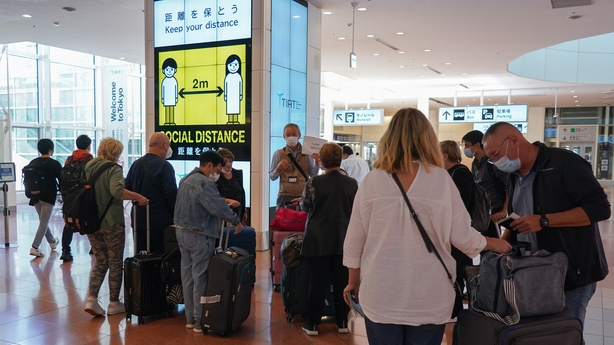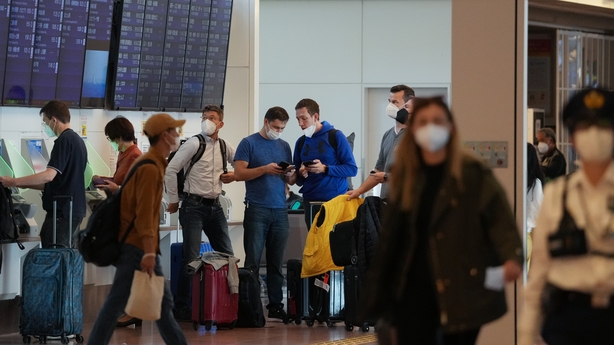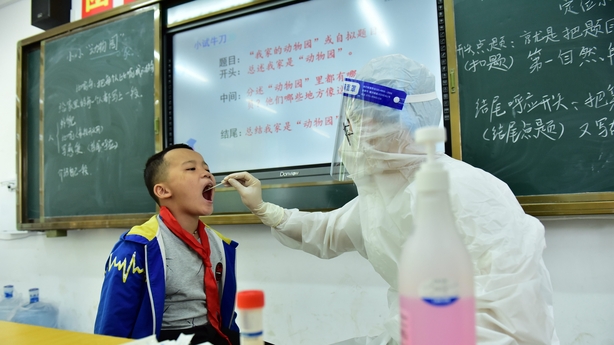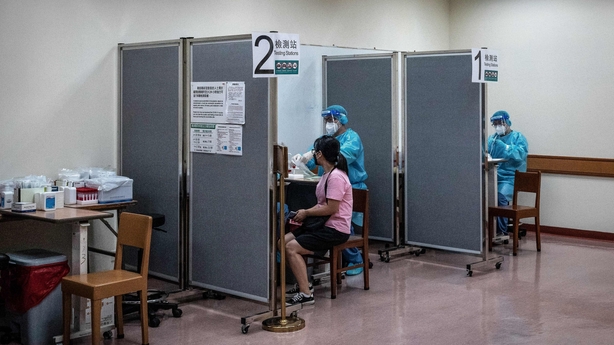Japan has reopened its doors to tourists after two-and-a-half years of tough Covid-19 restrictions, with officials hoping an influx of travellers enticed by a weak yen will boost the economy.
By mid-morning, tourists from Israel, France and Britain were already arriving, including Chris Irwin, 38, on his first trip to Japan.
"We have always wanted to come to Japan, and it seemed like the stars just aligned," said Mr Irwin, who arrived at Haneda airport from Britain with his wife.
Adi Bromshtine, a 69-year-old retiree from Israel, said she had been "planning before Covid and waiting and waiting" for the chance to visit Japan.
"It's a long, long dream come true," she said.
Japan closed its borders early in the pandemic, at one point even barring foreign residents from returning, and has only recently begun cautiously reopening.

In June, it began allowing tourists to visit in groups accompanied by guides, a requirement that was further relaxed to include self-guided package tours.
From today, visa-free entry resumed for travellers from 68 countries and territories.
Japan also lifted a cap on the number of arrivals and ended the package tour requirement.
Tourists must still present either proof of vaccination or a negative coronavirus test taken three days before departure.
In 2019, a record 31.9 million foreign visitors came to Japan, putting the country on track for its goal of 40 million by 2020, when Tokyo was supposed to host the Summer Olympics.
But in 2021, the figure plummeted to just 250,000.
In Japan, tourists will find a country that is still adhering to many of the health guidelines that helped it keep pandemic deaths to around 45,500, far lower than many other developed economies.
Masks are ubiquitous, and though not mandated by law, parliament is set to pass legislation allowing hotels to deny service to customers who refuse to wear one or flout other health rules.
Masks are worn not only indoors and on public transport, but outdoors as well, despite the government saying they are not necessary outside in uncrowded settings.

There is hand sanitiser at the entrance of most businesses, and plastic dividers are still often used in restaurants.
Many arriving tourists seemed unfazed by the rules though.
"We're more excited to see Japan than we will be annoyed by the masks, so we'll be fine with it," said Mr Irwin.
Another major change for tourists will be the weakness of the yen, which is hovering around 145 to the dollar, a level not seen for two decades.
The government has already had to intervene once to prop up the currency, and government spokesman Hirokazu Matsuno said officials are hoping rebounding tourism "will lead to recovery after the Covid pandemic and the revitalisation of communities."
There is certainly no shortage of demand, according to Antoine Chanthavong, of Paris-based travel agency Destination Japan.
Since the reopening announcement, "we've been absolutely drowning, we don't have enough time to deal with all the requests," he said.
Japanese carrier ANA has said reservations for international flights to the country surged five-fold after the reopening was announced.
For now, tickets are not coming cheap, with fuel prices soaring and airlines forced to take circuitous routes to avoid Russian airspace.
Itay Galili, a 22-year-old student arriving from Israel, said he was not put off by the cost.
"As soon as I heard it was going to reopen on the 11th, I started planning. Tickets were expensive... but no price (is) too heavy," he said.
For all the rebound in demand though, there is little expectation that tourist numbers will quickly reach their 2019 levels.
Before the pandemic, travellers from Hong Kong and mainland China made up 37% of all foreign visitors to Japan, and 44% of tourism income.
China steps up Covid measures in megacities as infections mount
Shanghai and other big Chinese cities, including Shenzhen, have ramped up testing for Covid-19 as infections rise, with some local authorities hastily closing schools, entertainment venues and tourist spots.
Infections have risen to the highest since August, with the uptick coming after increased domestic travel during the National Day "Golden Week" earlier this month.
Authorities this morning reported 2,089 new local infections for yesterday, the most since 20 August.
While many of the cases were found in tourist destinations, including scenic spots in the northern region of Inner Mongolia, megacities have started to report more cases this week.
Shanghai, China's financial capital of 25 million people, reported 28 local cases for yesterday, the fourth day of double-digit increases.
Keen to avoid a reprise of the lockdown in April and May, Shanghai said that all its 16 districts were to conduct routine testing at least twice a week until 10 November. That is a step up from once a week, a regime imposed after last lockdown.

Checks on inbound travellers and in places such as hotels should also be strengthened, authorities said.
As of yesterday, 36 Chinese cities were under various degrees of lockdown or control, affecting around 196.9 million people, versus 179.7 million in the previous week, according to Nomura.
In China's southern tech hub Shenzhen, where the highly transmissible BF.7 Omicron subvariant has recently surfaced, local cases more than tripled to 33 yesterday from a day earlier.
Inbound travellers will be subject to three tests over three days, authorities in the city of 18 million people said today.
In the northwestern city of Xian, which reported just over 100 cases from 1-10 October, authorities abruptly halted offline classes at schools and closed many public spaces, including the famous Terracotta Warriors Museum.

Despite China's very small caseload versus the rest of the world, and the toll its counter-epidemic policies exact on the economy and population, the government has repeatedly urged people to accept the measures.
"Once a large-scale rebound occurs, the epidemic will spread, and is bound to have a serious impact on economic and social development, and the final price will be higher and losses will be greater," state-controlled People's Daily wrote in a commentary this morning.
The Covid preventive steps come days ahead of a Communist Party congress starting on 16 October where Xi Jinping is expected to extend his leadership.

